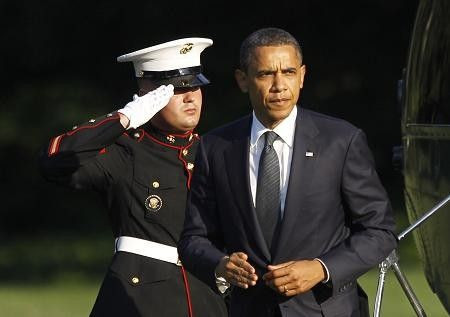NSA Surveillance Program: Is Obama Or Congress To Blame?

The revelation of the government's mass surveillance programs accessing phone-records data and online communications has some lawmakers and editorial boards up in arms against President Obama. He is, they say, guilty of George W. Bush-style overreach.
On Friday, the president deflected these allegations of overreach by placing liability on Congress. The truth is probably somewhere in the middle.
Obama’s defense of mass collection of data from tech and telecommunications companies -- which started under Bush's administration -- is that the program is checked by Congress as well as the Foreign Intelligence Surveillance Courts. “Every member of Congress has been briefed on these programs,” Obama said, referring to the phone-data collection by the National Security Agency. “These are programs that have been authorized by broad, bipartisan majorities repeatedly since 2006. And so I think at the outset it’s important to understand that your duly elected representatives have been consistently informed on what we are doing.”
On Wednesday, a report by the British Guardian newspaper revealed that the NSA was collecting so-called metadata from telecommunications companies on millions of Americans, including the numbers involved, locations and durations of calls. This was followed by reports that the government was collecting electronic data such as photographs and emails from nine tech companies, including Google and Facebook.
Congress, Obama challenged, can raise this debate or change the laws at any time. And the president does have a point. Since the terrorist attacks of Sept. 11, 2001, Congress has on many occasions signed laws to authorize the executive branch to collect increasing amounts of data and do so in secret, for national security reasons.
Still, there is concern that the Obama administration, as well as the Bush administration before it, has taken its surveillance authority beyond what Congress intended to allow.
“We have in the law a requirement that collection of data is tangible things related to an investigation,” Sen. Jeff Merkley, D-Ore., said on MSNBC Friday. “Now the standard for how those words are interpreted could involve a very small, limited peep-hole, if you will. Or it could be a barn door, the doors are wide open to any information. Certainly, what we’re discovering now is the administration and the FISA court have interpreted that language to be the barn door. Any information, any time. By declassifying the interpretations of those words by the FISA court, then we can have the debate over whether that’s what Congress intended.”
Merkley has pushed to declassify some of these opinions during reauthorization of the FISA Amendments Act, but his amendments have failed to pass.
Despite Obama’s assurance that there are checks built into the system, the ACLU feels Congress has helped create an “unchecked” executive branch when it comes to surveillance. “These revelations are a reminder that Congress has given the executive branch far too much power to invade individual privacy, that existing civil liberties safeguards are grossly inadequate, and that powers exercised entirely in secret, without public accountability of any kind, will certainly be abused,” ACLU Deputy Legal Director Jameel Jaffer said in a statement Thursday.
But if the blame falls on both sides, the job of reigning in the overreach will fall to Congress, though it’s unclear if there is enough public outrage to ignite a serious debate. As Sen. Jeff Flake, R-Ariz., argued Thursday, no administration will really check itself when it comes to its national security activities.
“I think it's incumbent on us,” said Flake, who was surprised at the scope of NSA’s surveillance. “One thing I've learned after being here a while is that the administration, whether it's Republican or Democrat, will take every tool they're given and use them to make sure that we're safe. I don’t think it’s always nefarious. They’re certainly trying to do what they think is right. It’s up to the Congress to make sure that there’s a balance between civil liberties and the need to have that information.”
© Copyright IBTimes 2025. All rights reserved.






















